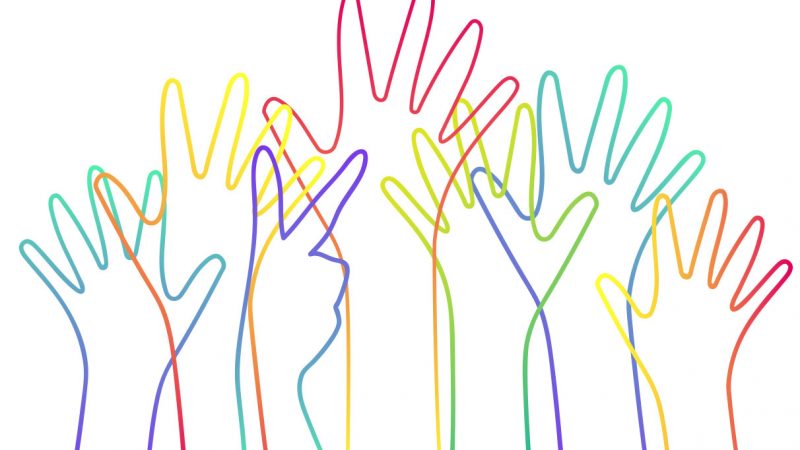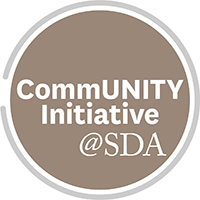On a special day dedicated to sharing voices, diverse perspectives and just plain fun, the USC School of Dramatic Arts held its first-ever CommUNITY Day this fall as part of its CommUNITY Initiative@SDA. The event gave faculty, staff and students alike an occasion to connect with their SDA community through theatre and non-theatre activities, allowing them to bridged art and activism. As a continuation of the event, the School is also hosting a 21-day civility challenge in which participants are tasked with specific acts of kindness through October.
“How can we — as theatre artists, practitioners and scholars — come together and remind ourselves that the very art of theatre is the art of collaboration, civility, building the ensemble and a really democratic experience? Theatre has always been a place of refuge, a safe haven for any and all that would like to come,” said Anita Dashiell-Sparks, associate dean of equity, inclusion and diversity, and associate professor of theatre practice.
In the day, participants may have practiced deep, focused breaths with faculty member Caitlyn Conlin in a mindfulness and meditation session. Or, explored the Bing Theatre’s scaffolding and stage in a movement exercise with Assistant Professor of Theatre Practice Zachary Steel and Associate Professor of Theatre Practice Stephanie Shroyer. Even, perhaps, heard a recap from students Steven Vargas, Elizabeth Schuetzle and Rickey Orr about their participation in The Artist as Citizen Conference at The Juilliard School in New York City.
Welcoming new perspectives
CommUNITY Day, held on Aug. 31, was an opportunity for the community to gain “a deeper understanding and value for the power of listening and being empathetic. Maybe to stop and consider these things before we act, before we speak. Just thought and consideration for the other,” Dashiell-Sparks said.
It was meant to provide participants “with a sense of play and exploration in all the different facets of the work that we do … a sense of belonging, not just to our art, but the people we make the art with … a different perspective,” she explained.
In a solo performance workshop led by faculty member Debra De Liso, attendees wrote about a significant turning point in their development and shared their stories. A moment as simple as a childhood memory proved to be a launching point for a solo performance, and held true to the notion that what we endure as children will stay with us forever.
Meanwhile, Associate Professor of Theatre Practice Kathleen Dunn-Muzingo guided participants through various vocal exercises, such as walking around while repeating multiple sounds and gestures, and sharing the origin of their full name.
The USC Kortshak Center for Learning and Creativity also gave a presentation on the resources available to students on campus, including one-on-one coaching for time management skills, study tips and figuring out the balance between social and academic life.
Need for art activism
CommUNITY Day was created in response to a School of Dramatic Arts climate survey. Participants voiced a desire to have a dialogue about the art being created, as well as the dynamics and issues affecting the community on a local and global level. Particularly, “to be able to do it with a sense of openness and healthy discourse in sharing different prospectives,” Dashiell-Sparks said. “Theatre is never dark, [as it is] symbolic light. Our art form has a long history through art and creativity and activism.”
Elaborating on the role that the multifaceted artist holds today, Dashiell-Sparks believes “the time is upon us to really remind ourselves as artists and activists within our field, that the world needs us now more than ever. … We have the opportunity as artists to hold up a mirror to society and create the world as it could be.”
About CommUNITY Initiative@SDA
Recognizing diversity, inclusivity and equity are central to the study and practice of the dramatic arts and to our duty as global citizens, the School and university have made a concerted effort and commitment to cultivating a diverse and inclusive environment on campus. The School has increased the number of works and resources by women, persons of color and underrepresented minorities that are taught in required core curriculum. The same conscious effort for equity and inclusivity is utilized by our Literary Committee when recommending plays for our annual season of productions. Additionally, the School annually hosts a diversity and inclusion summit for the SDA community that explores issues of race, gender, culture and identity through interactive workshops, panel discussions and performances. The School also works with the university’s offices of Student Affairs, and Equity and Diversity to develop programs and initiatives that raise awareness and provoke dialogue about significant campus climate issues.

